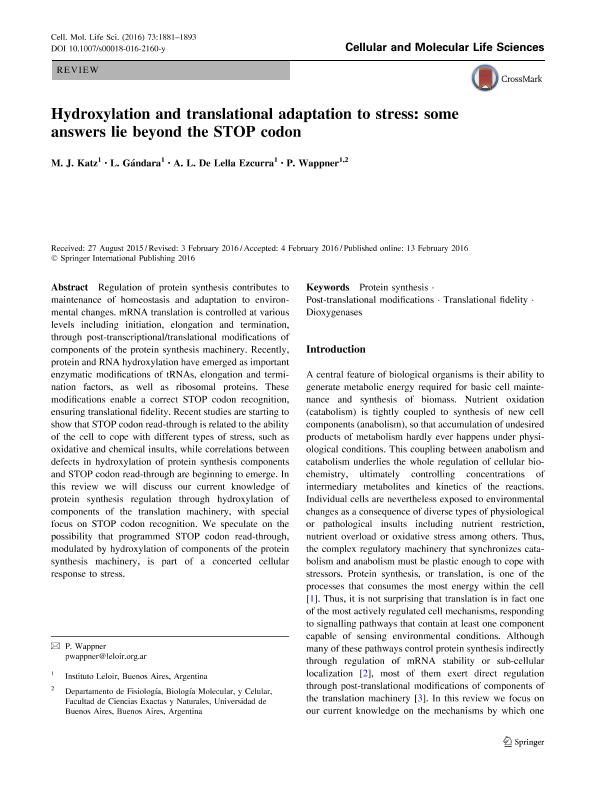Mostrar el registro sencillo del ítem
dc.contributor.author
Katz, Maximiliano Javier

dc.contributor.author
Gándara, Lautaro

dc.contributor.author
de Lella Ezcurra, Ana Laura

dc.contributor.author
Wappner, Pablo

dc.date.available
2017-09-18T15:59:24Z
dc.date.issued
2016-02
dc.identifier.citation
Katz, Maximiliano Javier; Gándara, Lautaro; de Lella Ezcurra, Ana Laura; Wappner, Pablo; Hydroxylation and translational adaptation to stress: some answers lie beyond the STOP codon; Springer; Cellular And Molecular Life Sciences; 73; 9; 2-2016; 1881-1893
dc.identifier.issn
1420-682X
dc.identifier.uri
http://hdl.handle.net/11336/24463
dc.description.abstract
Regulation of protein synthesis contributes to maintenance of homeostasis and adaptation to environmental changes. mRNA translation is controlled at various levels including initiation, elongation and termination, through post-transcriptional/translational modifications of components of the protein synthesis machinery. Recently, protein and RNA hydroxylation have emerged as important enzymatic modifications of tRNAs, elongation and termination factors, as well as ribosomal proteins. These modifications enable a correct STOP codon recognition, ensuring translational fidelity. Recent studies are starting to show that STOP codon read-through is related to the ability of the cell to cope with different types of stress, such as oxidative and chemical insults, while correlations between defects in hydroxylation of protein synthesis components and STOP codon read-through are beginning to emerge. In this review we will discuss our current knowledge of protein synthesis regulation through hydroxylation of components of the translation machinery, with special focus on STOP codon recognition. We speculate on the possibility that programmed STOP codon read-through, modulated by hydroxylation of components of the protein synthesis machinery, is part of a concerted cellular response to stress.
dc.format
application/pdf
dc.language.iso
eng
dc.publisher
Springer

dc.rights
info:eu-repo/semantics/openAccess
dc.rights.uri
https://creativecommons.org/licenses/by-nc-sa/2.5/ar/
dc.subject
Dioxygenases
dc.subject
Post-Translational Modifications
dc.subject
Protein Synthesis
dc.subject
Translational Fidelity
dc.subject.classification
Bioquímica y Biología Molecular

dc.subject.classification
Ciencias Biológicas

dc.subject.classification
CIENCIAS NATURALES Y EXACTAS

dc.title
Hydroxylation and translational adaptation to stress: some answers lie beyond the STOP codon
dc.type
info:eu-repo/semantics/article
dc.type
info:ar-repo/semantics/artículo
dc.type
info:eu-repo/semantics/publishedVersion
dc.date.updated
2017-09-08T20:07:44Z
dc.identifier.eissn
1420-9071
dc.journal.volume
73
dc.journal.number
9
dc.journal.pagination
1881-1893
dc.journal.pais
Alemania

dc.journal.ciudad
Berlín
dc.description.fil
Fil: Katz, Maximiliano Javier. Consejo Nacional de Investigaciones Científicas y Técnicas. Oficina de Coordinación Administrativa Parque Centenario. Instituto de Investigaciones Bioquímicas de Buenos Aires. Fundación Instituto Leloir. Instituto de Investigaciones Bioquímicas de Buenos Aires; Argentina
dc.description.fil
Fil: Gándara, Lautaro. Consejo Nacional de Investigaciones Científicas y Técnicas. Oficina de Coordinación Administrativa Parque Centenario. Instituto de Investigaciones Bioquímicas de Buenos Aires. Fundación Instituto Leloir. Instituto de Investigaciones Bioquímicas de Buenos Aires; Argentina
dc.description.fil
Fil: de Lella Ezcurra, Ana Laura. Consejo Nacional de Investigaciones Científicas y Técnicas. Oficina de Coordinación Administrativa Parque Centenario. Instituto de Investigaciones Bioquímicas de Buenos Aires. Fundación Instituto Leloir. Instituto de Investigaciones Bioquímicas de Buenos Aires; Argentina
dc.description.fil
Fil: Wappner, Pablo. Consejo Nacional de Investigaciones Científicas y Técnicas. Oficina de Coordinación Administrativa Parque Centenario. Instituto de Investigaciones Bioquímicas de Buenos Aires. Fundación Instituto Leloir. Instituto de Investigaciones Bioquímicas de Buenos Aires; Argentina. Universidad de Buenos Aires. Facultad de Ciencias Exactas y Naturales. Departamento de Fisiología, Biología Molecular y Celular; Argentina
dc.journal.title
Cellular And Molecular Life Sciences

dc.relation.alternativeid
info:eu-repo/semantics/altIdentifier/url/https://link.springer.com/article/10.1007%2Fs00018-016-2160-y
dc.relation.alternativeid
info:eu-repo/semantics/altIdentifier/doi/https://dx.doi.org/10.1007/s00018-016-2160-y
Archivos asociados
